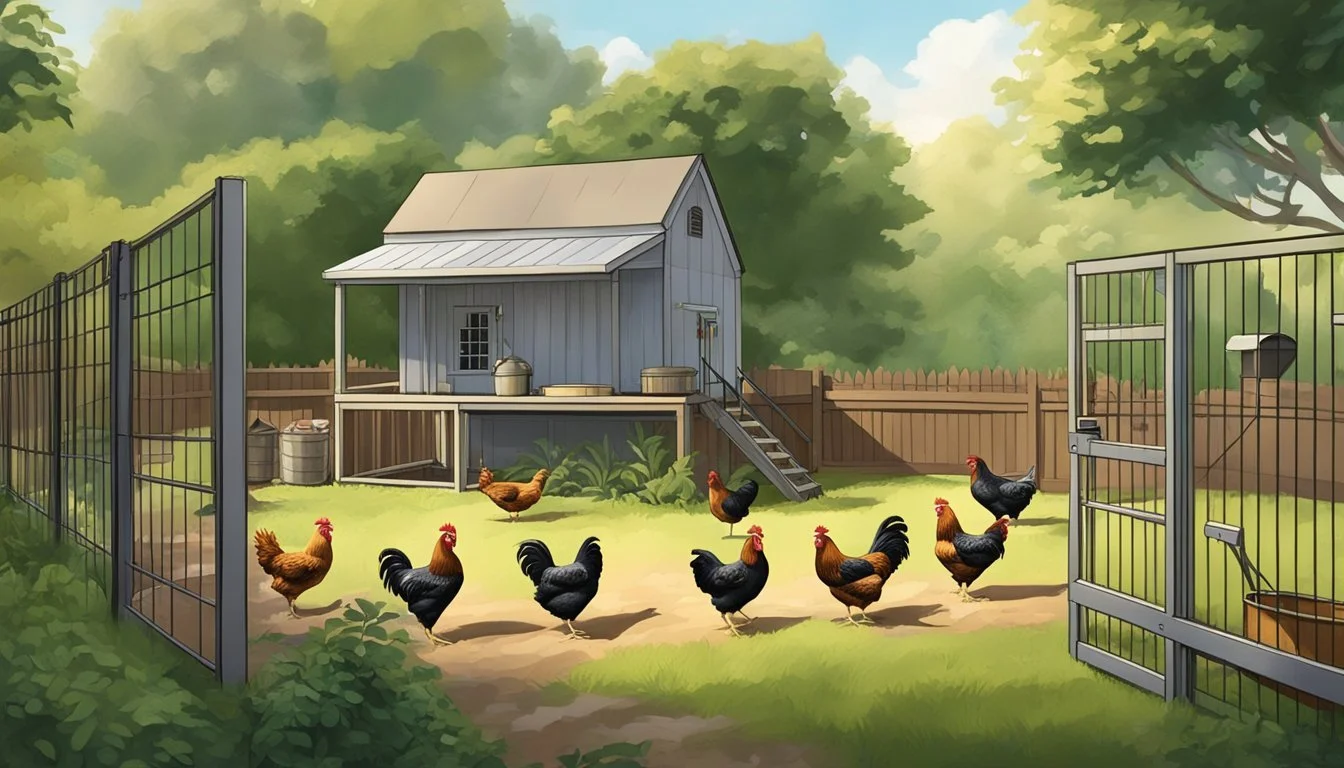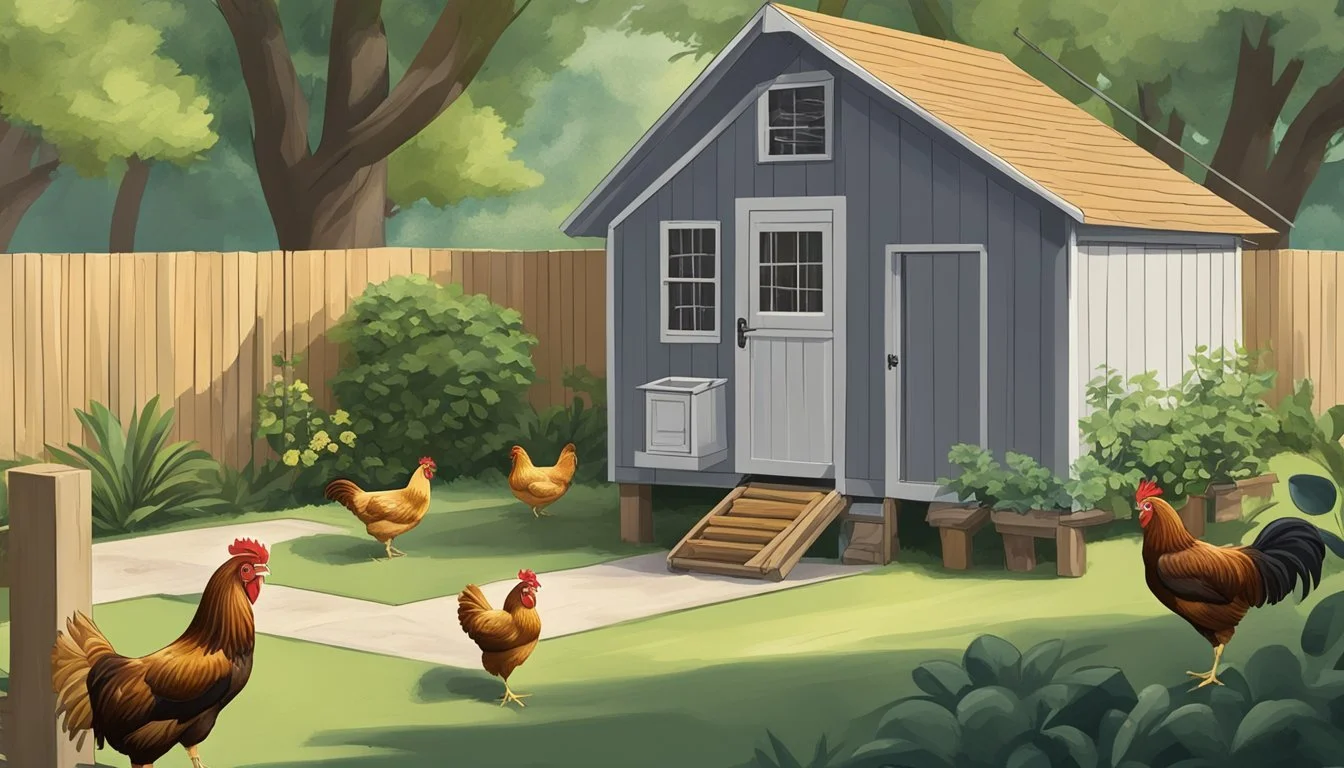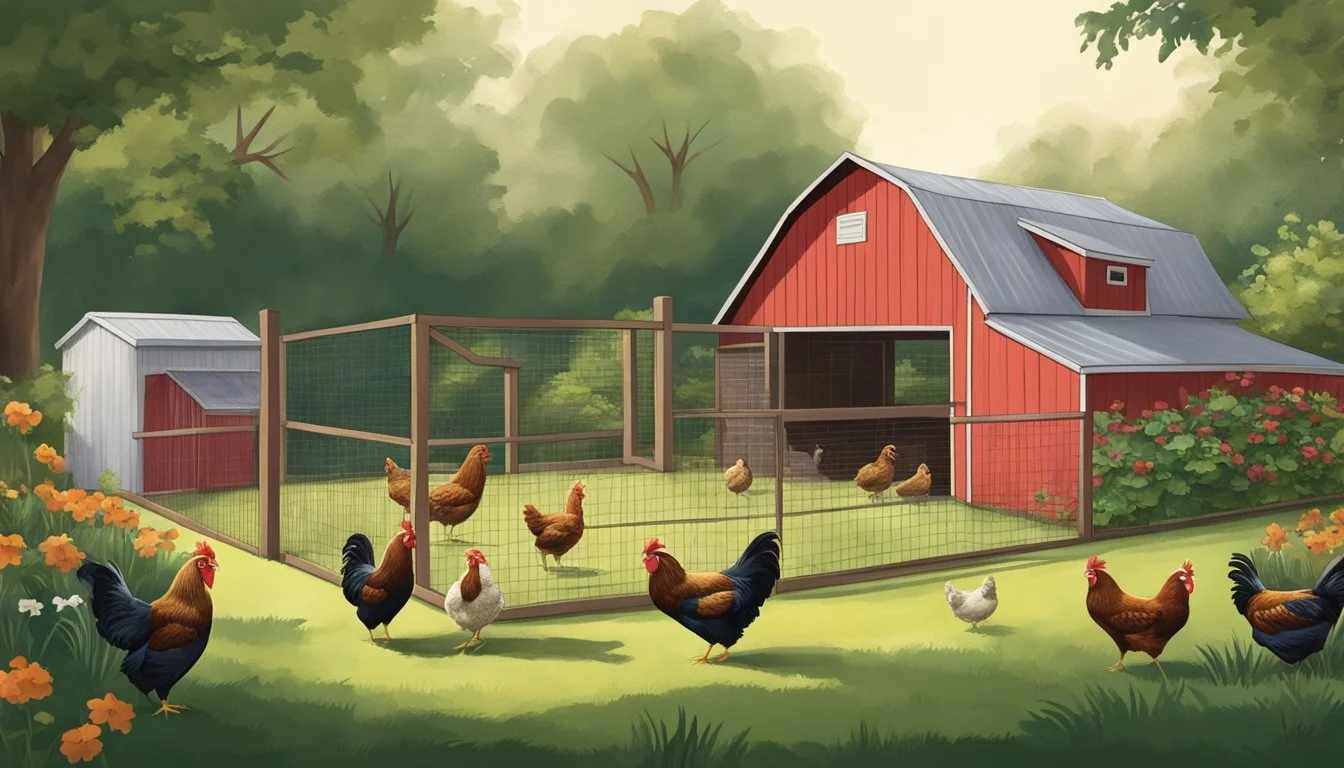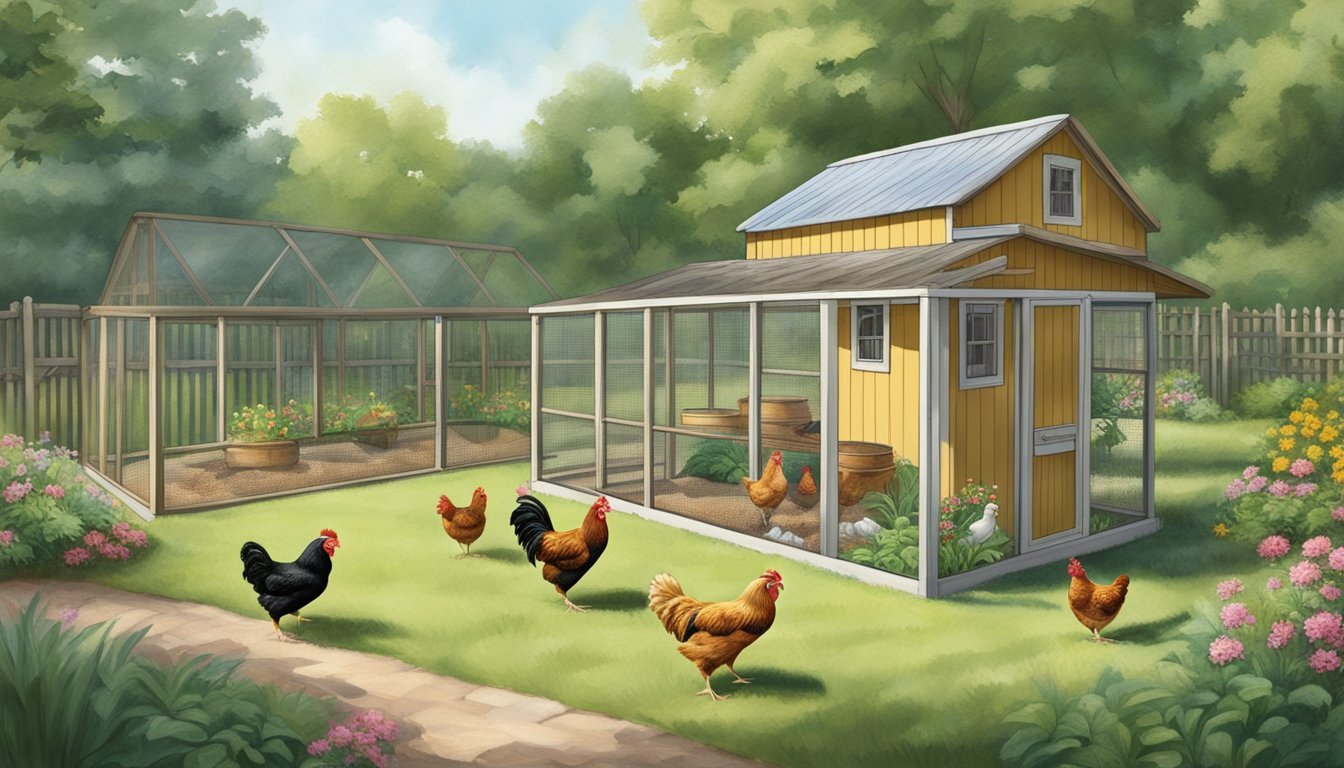Keeping Backyard Chickens in Baton Rouge, LA
A Beginner's Guide to Urban Poultry
In the heart of Louisiana, the city of Baton Rouge has specific regulations regarding the keeping of backyard chickens, reflecting a growing interest in urban poultry farming. As more residents are drawn to the practice for a sustainable source of fresh eggs, understanding the local ordinances is essential for maintaining harmony between human and feathered residents. The city prohibits the keeping of more than three chickens in residentially zoned areas on lots smaller than one acre. Additionally, roosters and certain other fowl are not allowed within these subdivisions due to noise concerns and the potential for disruption.
With an increase in popularity, Baton Rouge citizens who wish to raise backyard chickens must also be vigilant in maintaining the health and welfare of their birds. Chickens must be kept free of parasites and diseases, with regular health monitoring and preventative measures in place to avoid the spread of infections. The emphasis on keeping poultry healthy and safe is as much about public health as it is about animal welfare. Keeping birds in good condition ensures a productive backyard coop and mitigates any concerns regarding the spread of disease.
Before starting a backyard flock, it is crucial for Baton Rouge residents to familiarize themselves with the appropriate regulations set by the East Baton Rouge Parish Animal Control and Rescue Center. These regulations are in place not just for the wellbeing of the chickens but also to address the concerns of neighbors and community members. Compliance with local ordinances helps ensure that all involved can enjoy the benefits of backyard chickens without undue conflict or complications.
Benefits of Raising Backyard Chickens
Keeping chickens in one's own backyard presents a variety of advantages, from a steady supply of eggs to contributions to sustainable living, all while offering educational insights for individuals of all ages.
Egg Production
A primary benefit of raising backyard chickens is the consistent production of fresh eggs. Home-raised chickens provide a reliable food source, ensuring a daily supply of eggs that are fresher and often considered more flavorful than store-bought alternatives. Baton Rouge residents can cultivate their own small flocks, typically up to three chickens on residential lots under one acre, ensuring a personal stash of this valuable resource.
Egg freshness: Eggs procured from one's backyard are typically fresher than those bought from a store.
Economic benefit: While there are initial startup and ongoing costs associated with raising chickens, the long-term savings on egg purchases can be significant.
Sustainable Living
Backyard chickens contribute to a more sustainable lifestyle, offering organic fertilizer and aiding in home food production. Chicken manure can be composted and used to enrich the soil, bolstering one's garden without the need for chemical fertilizers.
Organic waste reduction: Chickens feed on kitchen scraps, reducing organic waste.
Fertilizer production: Chicken droppings provide rich nutrients for garden soil, promoting healthier plant growth.
Educational Experience
In addition to the practical benefits, raising backyard chickens serves as an educational experience that can involve the whole family. Through daily care, individuals learn about animal husbandry, responsibility, and the origins of their food. Programs such as 4-H offer structured opportunities for youth to engage in informative projects related to chicken raising, providing a structured pathway to learn about agriculture and animal care.
Learning outcomes: Raising chickens imparts lessons in biology, ecology, and responsibility.
4-H involvement: Engagement with 4-H programs offers structured educational frameworks for youths interested in poultry.
Understanding Local Ordinances
Before bringing chickens to your backyard in Baton Rouge, LA, it is crucial to be well-informed about the specific ordinances, permitting processes, and zoning regulations that are in place to ensure responsible poultry management within city limits.
City Regulations
In Baton Rouge, chickens must be confined to the owner's property at all times to avoid conflicts with neighbors or local wildlife. The city enforces specific regulations regarding the housing and location of chicken coops. Coops or enclosures must be situated a minimum of 10 feet from the nearest property line and at least 50 feet away from any residence other than that of the chicken owner. Additionally, while hens are permitted, roosters are prohibited within the city limits to minimize noise disturbance.
Permitting Process
To keep backyard chickens legally in Baton Rouge, property owners may be required to undergo a permitting process. One must contact the Animal Control and Rescue Center to obtain relevant information on permits necessary for raising chickens in a residential subdivision. This may include, but is not limited to, an inspection of the coop and adherence to the number of chickens allowed.
Zoning Laws
Zoning regulations vary widely and can affect how one may keep chickens on their property. The local government can provide guidance on such zoning laws, which dictate whether backyard chickens are permissible in certain residential areas. It is essential to verify if your specific zone allows for the keeping of chickens and how many you may keep, as the maximum number of chickens allowed can differ by city and county. In some locales, such as New Orleans, the maximum is up to four hens.
Setting Up Your Backyard Coop
When establishing a backyard coop in Baton Rouge, LA, it's essential to choose a proper location, meet the specific coop requirements, and ensure the safety and protection of your chickens.
Choosing the Right Location
The selected site for a chicken coop should be sunny and well-ventilated to maintain the health of the chickens. It is critical to ensure that the coop is at least ten feet from the nearest property line and a minimum of fifty feet from any residence not belonging to the owner, which adheres to local Baton Rouge ordinances.
Coop Requirements
By law, all coops or enclosures, including runs and housing, must conform to state and local regulations. For Baton Rouge residents, no permits are required for coops housing six chickens or fewer. The coop should provide a fenced area with enough space and shade for the chickens to roam, and an area to retreat from the sun.
Baton Rouge Requirements Details Distance from Property Line 10 feet Distance from Nearest Residence 50 feet Maximum number of Chickens without Permit Six
Safety and Protection
Creating a predator-proof environment is crucial to safeguard backyard fowl. Sturdy doors, heavy-gauge wire, and secure fences are fundamental in keeping predators out. A solid coop design prevents the entry of animals that may harm the chickens, and maintaining clean conditions helps discourage wildlife attracted by potential food sources, such as spilled chicken feed.
Chicken Breeds and Behavior
In Baton Rouge, LA, residents must choose breeds wisely and understand behavior to keep a harmonious backyard flock, especially since regulations prohibit roosters and certain types of fowl in residential areas.
Selecting Suitable Breeds
When selecting chicken breeds for a backyard flock in Baton Rouge:
Number of Chickens Allowed: Regulations permit the keeping of no more than three hens within residential subdivisions on lots smaller than one acre.
Roosters: Not allowed within the city limits, ensuring peace and adhering to local noise ordinances.
Other Poultry: Ducks, geese, turkeys, guinea fowl, and peacocks are similarly not permitted on smaller residential lots.
Given these restrictions, here are a few breeds that are suitable due to their temperament and size:
Leghorns: Known for excellent egg-laying, producing 280 to 320 eggs per year.
Brahmas: Recognized for their calm demeanor, which helps maintain peace within the flock.
Understanding Chicken Behavior
Chickens exhibit various behaviors that owners must understand to ensure their wellbeing:
Pecking Order: It's crucial to recognize this hierarchy to prevent bullying and stress within the flock.
Space Needs: Congestion can lead to aggression, so adequate space in coops and runs is essential.
Health: Good airflow and sunny coop locations contribute to healthier chickens.
By understanding these behaviors and needs, owners can maintain a healthy and stress-free backyard flock.
Daily Management and Care
In keeping backyard chickens, the poultry keeper must ensure a consistent routine of feeding, cleaning, and health monitoring. Adherence to these daily practices not only promotes the well-being of the chickens but also supports optimal egg production and maintains overall cleanliness and sanitary conditions in the coop.
Feeding
Chickens require a balanced diet consisting primarily of commercially available chicken feed, which ensures they receive the necessary nutrients. Adult chickens typically have a daily feed intake of about 1/4 pound of feed. Fresh water should be made available at all times, stored in clean containers to prevent contamination. It is important to remove leftover feed and change water daily to maintain hygiene and discourage pests.
Daily Food Requirements:
Adult chickens: Approximately 1/4 pound of feed per chicken
Water: Fresh and unlimited supply
Cleaning
The chicken coop requires daily cleaning to remove waste and prevent the accumulation of ammonia, which can lead to respiratory issues in chickens. Bedding should be kept dry and replaced if it becomes damp or soiled. A thorough cleaning of the coop, including scrubbing and disinfecting, should be undertaken weekly to ensure a sanitary environment. The area where chickens are kept should protect them from potential predators.
Daily Cleaning Tasks:
Waste Removal: Scoop and dispose of waste daily.
Bedding Management: Replace damp or soiled bedding.
Water and Feeder: Clean containers before refilling.
Health Monitoring
Each chicken must be observed daily for signs of illness or distress such as changes in appetite, abnormal droppings, or lethargic behavior. Regular inspection of the chickens and their living conditions helps to identify and address potential health issues promptly. Egg production should also be monitored as a sudden decrease can signal health problems.
Signs of Good Health:
Consistent egg production
Active behavior
Normal appetite and droppings
By incorporating these management and care practices, the keeper ensures a thriving environment for backyard chickens, leading to healthy poultry and a steady supply of eggs.
Legal Compliance and Restrictions
Keeping backyard chickens in Baton Rouge, Louisiana, requires adherence to specific local ordinances. Residents must familiarize themselves with the legal parameters to ensure that their activities do not become a nuisance, comply with slaughtering regulations, and follow proper procedures for egg sales and distribution.
Nuisance Laws
In Baton Rouge, ordinance enforcement is taken seriously to prevent chickens from becoming a public nuisance. One must keep chicken coops at least 50 feet from any dwelling, other than the owner's, to minimize noise and odor complaints. Regular inspections may be conducted to ensure compliance. Should a chicken owner violate nuisance laws, they can be summoned to court and may face penalties.
Slaughtering Regulations
Slaughtering chickens in Baton Rouge is subject to restrictions designed to uphold public health and safety standards. Slaughtering must be conducted humanely and for personal use only. In order to slaughter chickens legally, one may need to ensure that the activity is not visible from the street or neighboring properties, to avoid causing a public nuisance.
Egg Sales and Distribution
Those intending to engage in the selling of eggs must obey local regulations. This often includes obtaining a license fee, and fulfilling requirements for sanitation to ensure the eggs are safe for consumption. Distribution activities may be subject to additional inspections by government entities to ensure food safety standards are met.
Community Relations
When keeping backyard chickens in Baton Rouge, LA, it is essential to maintain positive community relations. This involves being considerate of neighbors, addressing any concerns they might have, and ensuring that your chicken-keeping practices do not become a nuisance to those living nearby.
Interacting with Neighbors
Residents should inform their neighbors of their intent to keep chickens. Communication is key; a resident should explain measures taken to minimize possible disturbances. Being proactive can prevent misunderstandings and complaints. Residents should also be open to feedback and willing to make reasonable adjustments should neighbors express concerns regarding the chickens.
Transparency: Share plans for keeping chickens with neighbors.
Receptiveness: Listen to neighbors' concerns and be willing to adjust practices if needed.
Managing Noise and Smells
Chickens can create noise, primarily from roosters, which are not allowed within city limits to avoid disturbances. Hens typically make less noise, but residents should still place coops away from property lines to minimize any impact. Sanitation practices are crucial to control odors and prevent health hazards. Regular cleaning of the coop and proper disposal of waste will reduce odors and maintain a healthy environment for both the chickens and neighboring residences.
Coop Placement: Keep coops at an adequate distance from neighboring dwellings.
Odor Control: Implement regular cleaning schedules to minimize odors and potential health concerns.
By adhering to these guidelines, residents can keep backyard chickens without causing issues within the community.
Dealing with Predators and Pests
In Baton Rouge, backyard chicken keepers must prioritize the health and safety of their flock by guarding against predators and pests. This section focuses on identifying common threats and outlines effective protective measures to ensure the well-being of chickens.
Common Threats
Chickens face various predators, such as hawks, owls, and raccoons, who can attack from above or breach enclosures. Pests including rats, mites, and lice can also pose significant health risks, potentially leading to disease and distress within the flock.
Protective Measures
Physical Barriers:
Enclosures should have a sturdy roof or netting to prevent aerial attacks from birds of prey.
Fences or walls must be buried at least 12 inches underground to thwart digging predators.
Hardware cloth is more effective than chicken wire for securing coop windows and ventilation openings.
Sanitation and Health:
Regular cleaning of the coop and proper disposal of waste reduces the attraction of rodents and limits the spread of diseases.
Inspecting chickens frequently for signs of parasites is crucial, and treatment should be administered when necessary.
Habitat Alteration:
Providing hiding spots with bushes or overhangs can give chickens refuge from predators.
Removing features that attract or assist predators, like tall trees near the coop or food leftovers, is advised.
Expansion and Breeding
When residents of Baton Rouge decide to expand their flock or enter the realm of breeding, they must navigate specific municipal regulations that dictate the terms of keeping and raising backyard chickens.
Increasing Your Flock
Baton Rouge regulations stipulate that a resident may keep no more than three hens on a property that is less than one acre without a permit. For those looking to increase their flock beyond this limitation, acquiring more land, or seeking special permission from the city, might be necessary. It is essential to stay updated with the East Baton Rouge Parish (EBRP) Animal Control Ordinance for any changes in the law or additional requirements.
Not permitted:
More than 3 chickens on less than one acre
Keeping roosters on properties in residential areas
Raising Chicks
With the intent to raise chicks in Baton Rouge, residents must understand that roosters are not allowed within city limits, thus breeding that requires a rooster must be conducted elsewhere. One should design their pens and runs to comfortably house an increased number of chickens, ensuring they are well-ventilated and provide ample space as per animal welfare considerations. The creation of a safe and nurturing environment is key for the healthy development of young chicks.
Essential considerations for chick pens:
Adequate ventilation
Sufficient space for movement
Protection from predators
Local Resources and Support
Residents in Baton Rouge, Louisiana, interested in raising backyard chickens have a myriad of local resources and support groups available. These entities help provide expertise, guidelines, and community support necessary for responsible and compliant chicken keeping.
Local Farming Groups
The Greater Baton Rouge Area is home to several local farming groups that support poultry enthusiasts. These groups often hold meetings and offer a platform for exchanging tips:
Baton Rouge Poultry Club: A community for sharing resources and expertise related to poultry care.
Central Louisiana Poultry Club: They provide information and support for backyard chicken keepers in Central, Zachary, and the surrounding regions.
City and Parish Resources
City and Parish offices offer essential resources to ensure residents comply with local ordinances and raise chickens responsibly:
Baton Rouge Animal Control and Rescue Center:
Contact for regulations: Provides copies of the EBRP Animal Control Ordinance upon request.
Address: 2680 Progress Rd, Baton Rouge, LA 70807
Phone: (225) 774-7700
Parish Extensions:
LSU AgCenter: Offers seminars and guidance on backyard poultry across Louisiana, including Lafayette, Lake Charles, and Shreveport.
East Baton Rouge Parish Extension: Specific resources for Baton Rouge residents looking to keep backyard chickens legally.
Residents should utilize these resources to stay informed and ensure their backyard chicken operations align with local laws and best practices.











